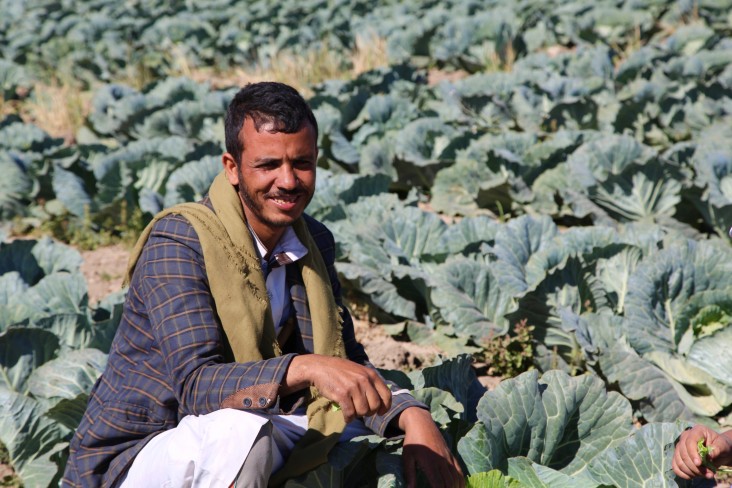Speeches Shim

With Modest Loans, Yemen's Small Businesses Thrive
“Thanks to this loan, I can hire more people, farm larger plots of land, and have a more comfortable life. I used to hire about seven workers; now, I can hire 15 to 20. My children used to work on the farm, but now they are able to go back to school.” – Ahmed Ali Al-Qubatiri
Ahmed has been a farmer all of his life, like his father and grandfather before him. He grows garlic, cabbage, tomatoes, and beans on his 18 acre plot in Dhamar, Yemen. However, due to the conflict, farmers like Ahmed contend with fuel shortages and extreme price hikes for inputs. As a result, many farmers across the country are now left with barren fields. Even though Ahmed has continued to farm through this crisis, he has found it increasingly difficult to buy fuel to pump water from his well—forcing him to farm smaller areas and produce lower quality crops.
Ahmed applied for a loan from Azal Microfinance Program to help install a new solar powered irrigation system on his land. Within just a few weeks, he received the loan and installed over 120 solar panels to power his pump. “I used to worry everyday about finding the diesel fuel I needed or securing enough money to buy it,” Ahmed explains. “When I couldn’t get diesel, my crops died, and I would just sit there not being able to do anything about it. With solar power, I’m not dependent on fuel anymore, and my land won’t go dry.”
Solar power will enable Ahmed to increase the amount of land he farms, diversify and improve the quality of his crops, and even lower his carbon footprint. Because he will produce more and better crops, he will not only improve his family’s livelihood, but he will also create jobs for other farmers in his community. In fact, in addition to nearly tripling the number of workers he hires, Ahmed also just signed an agreement to rent and farm two neighboring plots of land that have dried up. “This way the owners get money,” Ahmed shares, “and all I have to buy are seeds. As for water… it’s free!”
Ahmed’s farm is one of over 400 small businesses that have recently received financing from Azal as a direct result of USAID support. The USAID Yemen Economic Stabilization and Success (YESS) program, implemented by Pragma, supports self-reliance and resilience in the midst of Yemen’s deep economic and humanitarian crisis. In addition to facilitating trade and stabilizing crucial macro-economic policy issues, USAID/YESS supports enterprise-driven solutions to create jobs, drive growth, and leverage investment.
Small-and-medium-sized enterprises (SMEs) have tremendous potential to spur employment, trade, and economic transformation in countries across the Middle East and North Africa. SMEs provide a high percentage of private-sector employment and constitute the majority of businesses—over 80 percent in most countries in the region. However, only 8 percent of lending goes to SMEs, which contributes to the region’s aggregate financing gap of $210-$240 billion. Weak financial infrastructure, low competition, lenders’ difficulty assessing the SME market, and SMEs’ inexperience engaging with lenders all have a negative impact on businesses’ ability to obtain the financing they need to grow.
USAID/YESS provides banks and other lenders with the flexible risk analysis tools and approaches they need to expand into the SME sector, while also helping SMEs build capacity to effectively engage with lenders. Azal is one of three Yemeni lenders working with the program. Beginning in April, experts worked with Azal to harness credit management tools tailored to SME clients, strengthen the credit process, and manage SME credit risk.
Azal, like many other Yemeni lenders, used to automatically reject small business loans because they didn’t have the tools to analyze the applications. Now, they employ a sophisticated yet flexible approach to risk management. Instead of relying heavily on collateral, they base their assessments on efficient and time-effective assessments of the strength of the borrower’s business, which allows them to increase productivity, extend credit to a wider group of companies, and benefit from better returns.
Following intensive training, Azal launched a pilot SME lending program in October at all seven of its branches. In just three months, they approved over 400 loans. Overall, the three lenders receiving USAID/YESS technical assistance have approved over $5 million in loans. In the coming months, they expect to extend well over $1-2 million in additional financing.
“Our work has greatly evolved,” remarks an Azal loan officer. “Before, we only accepted cash or gold as collateral, and we required commercial or bank guarantees, which aren’t available to many borrowers. Now, we’ve expanded lending by 400 percent and the number of non-performing loans has dropped, especially with our new clients.” Ultimately, high-potential SMEs, like Ahmed’s farm, are engines of growth that catalyze economic recovery and community revitalization. In Yemen, and across the Middle East and North Africa, USAID is effectively engaging the private sector to create measurable business growth and generate significant numbers of jobs—even in some of the world's most challenging settings.
USAID’s Yemen Economic Stabilization and Success (YESS) program supports self-reliance and resilience by facilitating trade, increasing employment, supporting sustainable livelihoods, and stabilizing crucial macroeconomic policy issues. In the past year, YESS has leveraged private-sector commitments to generate over 3,000 jobs for at-risk populations, built international stakeholder support for a trade facilitation agreement, provided livelihood support to over 3,000 farmers, and assisted the Central Bank of Yemen to articulate major macro-financial reform challenges and support needs. The program is part of the USAID Middle East Economic Growth Best Practices Project, which provides the Middle East Bureau, field missions, and operating units with tools to support economic growth and reform across the Middle East and North Africa.

Comment
Make a general inquiry or suggest an improvement.